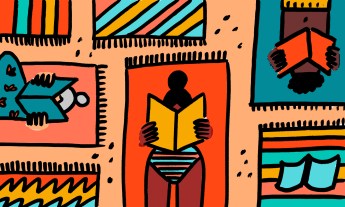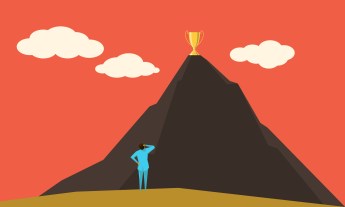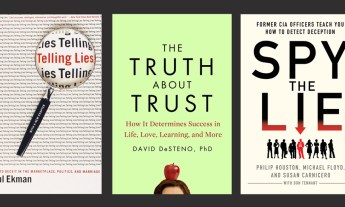Predictably Irrational: The Hidden Forces That Shape Our Decisions by Dan Ariely
Ariely (TED Talk: How to change your behavior for the better), a professor of psychology and behavioral economics, reveals through many studies why we so often behave in a way that totally contradicts logic. While reading it, I had to smile many times because I could see myself behaving exactly like the studies’ subjects. After reading Irrational, you may be a bit more gentler with your own and others’ irrationality. You will also know why getting something for free does feel so good.
— Hannah Bürckstümmer (TED Talk: A printable, flexible, organic solar cell)
How Emotions Are Made: The Secret Life of the Brain by Lisa Feldman Barrett
I had the pleasure of meeting Barrett (TED Talk: You aren’t at the mercy of your emotions — your brain creates them) at a TED event where we both spoke. Her book clarifies and, ultimately, debunks many myths about our emotions and how our brains creates them. It’s an interesting and thought-provoking read, and I found it to be engaging and fascinating. I strongly recommend it to anyone who thinks they can “read” people just by looking at them. (You can read an excerpt from her book here.)
— Simone Bianco (TED Talk with Tom Zimmerman: The wonderful world of life in a drop of water)
Willpower: Why Self-Control Is the Secret to Success by Roy F. Baumeister and John Tierney
I love this book because it explained so many things to me … about me. Willpower is, quite clearly, a primary tool for success in work and love. And this book is packed with gripping stories about those who have struggled with temptation (from Oprah and Eric Clapton to Henry Morton Stanley and more) that vividly illustrate how to engage this precious fuel, willpower, to win in business and romance. And I finally know why, after days of being soooo good, I get to an airport and go wild on sweets. This book reaches deep into those most fascinating topics: human nature; how the brain and body work; why we do the things we do; and how to battle our darker angels to succeed in life.
— Helen Fisher (TED Talk: The brain in love)
Braving the Wilderness: The Quest for True Belonging and the Courage to Stand Alone by Brené Brown
Brown first came to my attention through her TED talk (The power of vulnerability). I was struck by the courage it took her to be so honest — to acknowledge that being vulnerable doesn’t mean being weak. In this book, she again shatters the myth that having the courage to stand alone doesn’t isolate us. Instead, it brings us into a fuller experience of community. This message meant a lot to me after I was forced by take a stand by myself.
— Gretchen Carlson (TED Talk: How we can end sexual harassment at work)
Daring Greatly: How the Courage to Be Vulnerable Transforms the Way We Live, Love, Parent, and Lead by Brené Brown
This book is all about having courage. Based on 12 years of research, it explains how vulnerability is both the core of difficult emotions like fear, grief and disappointment and the birthplace of love, belonging, joy, empathy, innovation and creativity. If we want to lead full lives, Brown (TED Talk: The power of vulnerability) encourages us to step into the arena in all aspects of our lives and dare greatly. She writes, “When we shut ourselves off from vulnerability, we distance ourselves from the experiences that bring purpose and meaning to our lives.”
— Christine Porath (TED Talk: Why being respectful to your coworkers is good for business)
The World Beyond Your Head: On Becoming an Individual in the Age of Distraction by Matthew Crawford
Did you think being an individual was to be free of all relations and encumbrances and demands? Think again, says Crawford. We are a social animal, and we only become ourselves when attending to the demands of that which allows us to lose our detached self-possession.
— Sajay Samuel (TED Talk: How college loans exploit students for profit)
Quiet: The Power of Introverts in a World That Can’t Stop Talking by Susan Cain (TED Talk: The power of introverts)
Regardless of where you happen to fall on the introvert-ambivert-extravert spectrum, I highly recommend this insightful and accessible book. Touchingly personal and well-researched, this book is what inspired me to pursue social psychology during my doctoral program. At this crossroads in US history, it is particularly relevant to understand and celebrate the traits that define each of us as leaders. I am so happy I consumed Quiet via the audio version, since the book’s takeaways really come to life through the understated yet powerful delivery of the narrator.
— Dana Kanze (TED Talk: The real reason female entrepreneurs get less funding)
Flow: The Psychology of Optimal Experience by Mihaly Csikszentmihalyi
Want to understand happiness? In this book, Csikszentmihalyi (TED Talk: Flow, the secret to happiness) describes a state of consciousness — which he calls “flow” — in which people typically experience deep enjoyment, creativity and a total involvement. He also demonstrate the ways that this positive state can be controlled and not just left to chance. By ordering the information that enters our consciousness, we can discover true happiness and greatly improve the quality of our lives.
— Lisa Dyson (TED Talk: A forgotten space age technology could change how we grow food)
The Person You Mean to Be: How Good People Fight Bias by Dolly Chugh
This is such a thought-provoking read for all of us, given the societal issues today. Chugh (TED Talk: How to let go of being a “good” person and become a better person) argues that we might be better off by not striving to be perfect when it comes to the hot-button topics today but by being good-ish. (Read an excerpt from the book here.)
— Chieh Huang (TED Talk: Confessions of a recovering micromanager)
How Proust Can Change Your Life by Alain de Botton
Marcel Proust wrote well over one million words replete with deep insights and observations about human nature, but who has the time to read that much? Luckily, de Botton (TED Talk: A kinder, gentler philosophy of success) has distilled Proust’s work into a delightful, witty and wise book about the human condition. It can inspire hope by making you realize that so much of we feel is “modern society unhappiness” is actually a part of human nature.
— Sebastian Wernicke (TED Talk: How to use data to make a hit TV show)
Astonish Yourself: 101 Experiments in the Philosophy of Everyday Life by Roger-Pol Droit
Droit is a great French philosopher, and I was so glad when the English-language version of this book came out. I always keep a few copies of it at home to offer as gifts to good friends. It contains very simple experiments to discover the subconscious and unexpected processes in your brain, and it’s great inspiration for those of us who build technologies and create new kinds of experiences.
— Rebecca Kleinberger (TED Talk: Why you don’t like the sound of your own voice)
Grit by Angela Duckworth
In this compelling and interesting read, Duckworth (TED Talk: Grit — the power of passion and persistence) explores the concept of grit. Through numerous real-life examples of high achievers, she examines the idea that they possess a combination of passion and perseverance — not just talent. This book really resonated with me, a person who sees herself as possessing grit. It made me recognize that much of my success in athletics, work and life has been due to my effort and unrelenting determination, despite my not being the fastest or most talented. I hope that I can teach my own daughter to have grit.
— Minda Dentler (TED Talk: What I learned when I conquered the world’s toughest triathlon)
One dominant belief in our culture is that inherited intelligence dictates so much of our success, despite copious examples to the contrary. Duckworth’s research, which is clearly explained in this book, helps spread the good news there’s more to the story of what drives success — and more that we can do to enhance everyone’s chances.
— David Burkus (TED Talk: Why you should know how much your coworkers get paid)
Mindset: The New Psychology of Success by Carol Dweck (TED Talk: The power of believing you can improve)
Dweck’s treatise on growth versus fixed mindsets has been extraordinarily influential in my professional and personal life. One of the greatest things that holds us back from reaching our full potential is fear of failure. By believing that we can grow and change our abilities through hard work and grit, we can get past that fear and unlock all sorts of possibilities in ourselves.
–Margaret Gould Stewart (TED Talk: How giant websites design for you and a billion others)
Biased: Uncovering the Hidden Prejudice That Shapes What We See, Think and Do by Jennifer Eberhardt
Stanford University professor Eberhardt draws on years of her own rigorous academic research and the work of others to effectively break down how bias insidiously operates in each of our lives — as perpetrators, victims, bystanders and helpers — every day. The deeply moving personal and professional experiences that she shares help facilitate a tangible connection to this important subject matter. A must read for scholars and laypeople alike, this book reaches beyond the merely descriptive to prescribe courses of action that have been found to be effective in combating our unconscious bias.
— Dana Kanze (TED Talk: The real reason female entrepreneurs get less funding)
Stumbling on Happiness by Daniel Gilbert
It’s hard to walk through a library without stumbling on a book about happiness, but this one is my all-time favorite. Gilbert (TED Talk: The psychology of your future self) shares fascinating insights from scientific research on happiness and shows us how our most fundamental assumptions about what will make us happy often turn out to be wrong. This book is so entertaining and funny that I can’t read it in public because it makes me laugh out loud (so it’s perfect for a desert island!).
— Elizabeth Dunn (TED Talk: Helping others makes us happier — but it matters how we do it)
Big Magic: Creative Living Beyond Fear by Elizabeth Gilbert
Forget what you think about Eat, Pray, Love. Gilbert (TED Talk: Success, failure and the drive to keep creating) has a phenomenal lens on how creativity really works. Throughout the book, she reminds you that if you take creativity off a precious pedestal and just keep working on something, magic does happen.
— Rachel Botsman (TED Talk: The case for collaborative consumption)
The Philosophical Baby: What Children’s Minds Tell Us About Truth, Love and the Meaning of Life by Alison Gopnik
This fascinating book offers an intriguing dive into the minds of our young and how they develop and function. Gopnik (TED Talk: What do babies think?) encourages us to revisit many of our assumptions on these subjects and to confront anew the the meaning of life and other philosophical big questions. Whatever your take on her overarching point — that our children can enlighten us adults — her book is bound to make you think and to find hope in the miracle of the human mind.
— Isaac Lidsky (TED Talk: What reality are you creating for yourself?)
The Examined Life: How We Lose and Find Ourselves by Stephen Grosz
This book s a collection of deeply moving stories of self-discovery by psychoanalyst Grosz. His writing about therapy has been described as “like a combination of Chekhov and Oliver Sacks.” Whether it’s finding and keeping love, facing trauma in a family history, or confronting the most sensitive personal or professional vulnerabilities, this book brings hope by showing that humans have the capacity to heal — even bloom — when living with life’s most painful emotional scars.
— Alexandra Sacks (TED Talk: A new way to think about the transition to motherhood)
Shared Reality: What Makes Us Strong and Tears Us Apart by E. Tory Higgins
Columbia University professor Higgins introduces readers to his fascinating social psychological theory of “shared reality” with patience and passion. Although the theoretical underpinnings run deep, readers can easily forge an intimate relationship with these findings. Perhaps the ultimate “desert island” book topic, shared reality enables us to better understand our innate yearning to connect meaningfully with others. More important now than ever, this book helps us be better parents, friends, partners, coworkers and community members by sharing what is real about the world around us.
— Dana Kanze (TED Talk: The real reason female entrepreneurs get less funding)
How To Be Idle: A Loafer’s Manifesto by Tom Hodgkinson
This is a funny, eye-opening guide to why and how we are living is making us so miserable, but we can’t even say that, let alone object. This book explains how we were not always so work obsessed; instead, work was integrated into our lives, which were more than what we did to earn money. Plus, there’s a great chapter on why we do hangovers all wrong.
— Simone George (TED Talk with Mark Pollock: A love letter to realism in a time of grief)
Wherever You Go, There You Are by Jon Kabat-Zinn
Learning to be ‘present’ in your life and to appreciate every single moment is certainly a wonderful skill to have. Being mindful has made such a difference in my life — most significantly in adapting and accepting the acute discomfort that I live with as a double amputee. Practicing mindfulness has enabled me to include pain into my positive idea of what it means to ‘feel’ life — the full spectrum of what it means to be alive!
— Gill Hicks (TED Talk: I survived a terrorist attack. Here’s what I learned)
Thinking, Fast and Slow by Daniel Kahneman
Kahneman (TED Talk: The riddle of experience vs. memory) shares what he has learned in decades of research — a wonderful, clear and simple analysis of our embedded self-delusions and the ‘dual-process’ model of our brains.
— Tom Hulme (TED Talk: What can we learn from shortcuts?)
The World as Laboratory: Experiments with Mice, Mazes and Men by Rebecca Lemon
Even if we are influenced, shaped and controlled in our behaviors and actions, at least we are free inside — right? Not so, argues Lemov in his book. The attempt to engineer the interior space of people began over a century ago with the field of behavioral psychology, and its subsequent history is chillingly recounted in this scholarly yet accessible book.
— Sajay Samuel (TED Talk: How college loans exploit students for profit)
Doing Good Better by Will MacAskill
“Effective altruism” is one of the most important new social movements, and this book is a great introduction to it. MacAskill (TED Talk: What are the most important moral problems of our time?) is a philosopher from Oxford who explains how a lot of our intuitions about how to help the world are misguided, and how we can make a bigger difference in the world with some simple shifts in our behavior.
— Julia Galef (TED Talk: Why you think you’re right — even if you’re wrong)
Improv Wisdom by Patricia Ryan Madson
This book is a refreshing change from the usual self-help psychology in that it introduces you to improv and its principles and applies them to everyday life. I enjoyed learning more about the art of improv and having the opportunity to think about how I approach life and to try something different. It’s also a concise, well-organized book that is easy to revisit over and over. I recommend trying improv if you can — it’s unbelievably fun.
— Sabine Doebel (TED Talk: How your brain’s executive function works)
The Singing Neanderthals: The Origins of Music, Language, Mind and Body by Steven Mithen
This is a brilliant read for anyone who is passionately connected to music. Mithen brings together psychology, evolutionary biology, neuroscience, archaeology and more to uncover just how deeply music is embedded in our species. Immensely readable, quirky and full of insight into our human condition, this book drops my jaw at least once per chapter.
— Meklit Hadero (TED Talk: The unexpected beauty of everyday sounds)
The Skeptic’s Guide to the Universe: How to Tell What’s Really Real In a World Increasingly Full of Fake by Steven Novella
Novella is right up there with Carl Sagan as people who taught me the joy and humility that comes with understanding how our brains actually work (or don’t!) in our quest to understand the cosmos and ourselves. This is the ultimate guide to critical thinking, with all the charm and irreverence that Steve and the other “Rogues” bring to their weekly podcast of the same name. As the subtitle suggests, this book comes at a time when we need it most.
— Matt Russo (TED Talk: What does the universe sound like? A musical tour)
The Wizard of Oz and Other Narcissists: Coping with the One-Way Relationship in Work, Love and Family by Eleanor D. Payson
This incredibly insightful book details the underlying motivations and behaviors of those with narcissistic personality disorders. It also describes the interpersonal relationship characteristics between individuals with NPD and others at work and at home. In a world filled with increasing self-absorption, it’s is a terrific read.
— Susan Robinson (TED Talk: How I fail at being disabled)
How to Change Your Mind: What the New Science of Psychedelics Teaches Us About Consciousness, Dying, Addiction, Depression, and Transcendence by Michael Pollan
If there were one book that I could make everyone read — outside my primary life’s focus of reforming our system of agriculture — it would be this one. In short, psychedelic drugs can be used as therapy for everything from addiction and depression to the existential angst that accompanies the dying process for many people. Pollan (TED Talk: A plant’s eye view) brings his exceptional storytelling skills and his journalistic sense of skepticism to the history and the current science around psychedelics. Riveting, fascinating and enjoyable.
— Bruce Friedrich (TED Talk: The next global agricultural revolution)
Practical Ethics by Peter Singer
This is a great book for someone who wants to consider how they could live a more ethical life or better understand some issues in applied ethics. It’s an extremely well argued, compelling book addressing topics relevant to all of us. You don’t have to agree with everything that Singer (TED Talk: The why and how of effective altruism) writes in order to find it thought-provoking and worth the read. In terms of books that changed my life, this one is right up there.
— Sabine Doebel (TED Talk: How your brain’s executive function works)
The Power of Meaning: Finding Fulfillment in a World Obsessed with Happiness by Emily Esfahani Smith
I was inspired by Smith (TED Talk: There’s more to life than being happy) after meeting her at the 2017 TED conference. There is so much of American culture that’s reliant on happiness, and her book is a good reminder that we might be focusing on the wrong things and perhaps meaning is a better focus for us.
— Grace Kim (TED Talk: How cohousing can make us happier and live longer)
Mistakes Were Made (But Not By Me): Why We Justify Foolish Beliefs, Bad Decisions, and Hurtful Acts by Carol Tavris and Elliot Aronson
This book forces me to be self-reflective and recognize when cognitive dissonance enters my decision-making process. Citing numerous historical examples in which this psychological phenomenon has negatively impacted outcomes, Tavris and Aronson brilliantly show the reader how we can identify dissonance in our choices, ultimately helping you make better decisions and foster better relationships.
— Kelly Richmond-Pope (TED Talk: How whistle-blowers shape history)
Nudge: Improving Decisions About Health, Wealth and Happiness by Richard Thaler
This book really added another perspective for me. It explained why we all make — quite often — unwise choices due to a lack of information. Not to spoil the punchline, but I found it very interesting that the cause of making bad decisions can be found within ourselves.
— Matthias Müllenbeck (TED Talk: What if we paid doctors to keep people healthy?)
Becoming Wise: An Inquiry into the Mystery and Art of Living by Krista Tippett
This book is full of the same kind of nuanced, wide-ranging intelligence about what makes us human as her radio show and podcast, “On Being.” You’ll close the last page feeling intelligently hopeful about how our wounds actually do serve to make us more wise and connected.
— Courtney Martin (TED Talk: The new American dream)
The Hidden Brain: How Our Unconscious Minds Elect Presidents, Control Markets, Wage Wars and Save Our Lives by Shankar Vedantam
What role do unconscious biases play in how we make decisions when we buy, think, vote, judge and convict? What we don’t know about what we believes shapes much more about our lives and our actions than we realize. The author does a great job of educating readers about the role of unconscious bias in a page-turning, interesting way.
— Casey Brown (TED Talk: Know your worth, and then ask for it)
Why Buddhism is True: The Science and Philosophy of Meditation and Enlightenment by Robert Wright
Wright (TED Talk: The evolution of compassion) writes with a combination of humility and wisdom, summarizing the best research on the science behind Buddhist practices in an approachable manner. This book makes me feel hopeful that there is a life beyond our human neuroses, no matter what form they take, and it’s a great read for both skeptics of meditation and experienced meditators.
— Mara Mintzer (TED Talk: How kids can help design cities)
Go here to see the other book categories in the gift guide
Do these recommendations look familiar? They’ve been curated from TED’s reading lists











